|
De Zwitserse schrijver Emil Zopfi werd geboren op 4 januari 1943 in Wald. Zie ook mijn blog van 4 januari 2009 en ook mijn blog van 4 januari 2010.xml:namespace prefix = o ns = "urn:schemas-microsoft-com:office:office" />
Uit: Pfarrer Stähelis Geheimnis
Es war ein dunkler Nachmittag im Juni des Jahres 1753 in London. Lord Cotton liess sich mit einer Kutsche von Pall Mall nach Hammersmith fahren. Die Schatten der Menschen in den Strassen trieben im dicken Nebel vorbei wie schwarze Fische in einer Erbsensuppe. Bei der französischen Kirche von Hammersmith bezahlte er den Kutscher. Dann überquerte er mit langen, langsamen Schritten den Kichhof und betrat den Friedhof.
Das Begräbnis ging seinem Ende entgegen. Ein junger Prediger hielt die Andacht französischer Sprache. Als er Lord Cotton erblickte, stockte er für einen Augenblick. Die Trauernden drehten ihre Köpfe und starrten den Lord stumm an.
Nach dem Schlussgebet eilte der Prediger um das frisch aufgeworfene Grab und begrüsste Lord Cotton untertänigst. Er war bekannt als Berater von König Georg II in religiösen Fragen. Der Prediger verbeugte sich und fragte: "Darf ich Ihnen Mrs Stäheli vorstellen, Milord. Die arme Witwe."
Cotton nickte flüchtig, drückte eine kalte Hand, blickte für einen Moment in ein stumpfes Gesicht hinter einem schwarzen Schleier und wünschte Beileid. Die Frau sagte kein Wort und blieb regungsslos stehen.
Lord Cotton wandte sich zum Prediger. "Ich bin beauftragt, im Namen seiner Majestät, des Königs, dieses Beileidsschreiben zu überreichen." Er zog aus einer Tasche seines Mantel ein schmales Kuvert mit eingeprägter goldener Krone und reichte es dem Prediger. Die Frau stand noch immer reglos und stumm.
"Es tut mir leid, Milord. Mrs Stäheli versteht kein Englisch", erklärte der Prediger mit gedämpfter Stimme.
"Vous parlez Francais?" wandte sich Lord Cotton and die Witwe. Aber der Prediger unterbrach ihn: "Mrs Stähelin spricht nur Deutsch. Sie und ihr verstorbener Gemahl, Pfarrer Stäheli, stammten aus der Schweiz. Aus dem deutschsprachigen Teil des Landes."

Emil Zopfi (Wald, 4 januari 1943)
De Amerikaanse dichter, songwriter en frontman van Silver Jews David Berman werd geboren op 4 januari 1967 in Williamsburg, Virginia. Zie ook mijn blog van 4 januari 2009 en ook mijn blog van 4 januari 2010.
The Moon
A web of sewer, pipe, and wire connects each house to the others.
In 206 a dog sleeps by the stove where a small gas leak causes him
to have visions; visions that are rooted in nothing but gas.
Next door, a man who has decided to buy a car part by part
excitedly unpacks a wheel and an ashtray.
He arranges them every which way. Its really beginning to take
shape.
Out the garage window he sees a group of ugly children
enter the forest. Their mouths look like coin slots.
A neighbor plays keyboards in a local cover band.
Preparing for an engagement at the high school prom,
they pack their equipment in silence.
Last night they played the Police Academy Ball and
all the officers slow-danced with target range silhouettes.
This year the theme for the prom is the Tetragrammaton.
A yellow Corsair sails through the disco parking lot
and swaying palms presage the lot of young libertines.
Inside the car a young lady wears a corsage of bullet-sized rodents.
Her date, the handsome cornerback, stretches his talons over the
molded steering wheel.
They park and walk into the lush starlit gardens behind the disco
just as the band is striking up.
Their keen eyes and ears twitch. The other couples
look beautiful tonight. They stroll around listening
to the brilliant conversation. The passionate speeches.
Clouds drift across the silverware. There is red larkspur,
blue gum, and ivy. A boy kneels before his date.
And the moon, I forgot to mention the moon.
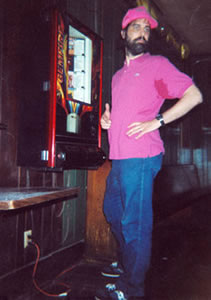
David Berman (Williamsburg, 4 januari 1967)
De Chinese schrijver Gao Xingjian werd geboren op 4 januari 1940 in Ganzhou, in de provincie Jiangxi. Zie ook mijn blog van 4 januari 2007 en ook mijn blog van 4 januari 2008 en ook mijn blog van 4 januari 2009 en ook mijn blog van 4 januari 2010.
Uit: One Man's Bible
You don't know what other things you will do or what else there is to do but this is of no concern. If you want to do something you proceed to do it, it's fine if it is done but if it is not it doesn't matter. And you do not have to persist in doing something for if at a particular moment you feel hungry and thirsty you simply go and have something to eat and drink. Of course you continue to have your own opinions, interpretations, tendencies and can even get angry as you haven't got to the age when you no longer have the energy for anger. Naturally, you still become indignant but it is without a great deal of passion. Your capacity for feelings and sensory pleasures remains intact but as this is so then so be it. However there is no longer remorse, remorse is futile and, needless to say, damaging to the self.
For you only life is of value, you have a lingering attachment to it and it continues to be interesting as there are still things to discover and to amaze you, and it is only life that can excite you. That's exactly how it is with you, isn't it?
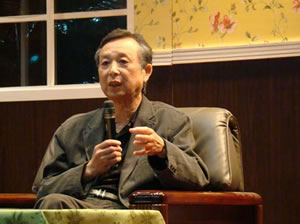
Gao Xingjian (Ganzhou, 4 januari 1940)
De Amerikaanse schrijfster en biografe Doris Kearns Goodwin werd geboren op 4 januari 1943 in New York. Zie ook mijn blog van 4 januari 2009 en ook mijn blog van 4 januari 2010.
Uit: Wait Till Next Year
When I was six, my father gave me a bright red scorebook that opened my heart to the game of baseball. After dinner on long summer nights, he would sit beside me in our small enclosed porch to hear my account of that day's Brooklyn Dodger game. Night after night he taught me the odd collection of symbols, numbers, and letters that enable a baseball lover to record every action of the game. Our score sheets had blank boxes in which we could draw our own slanted lines in the form of a diamond as we followed players around the bases. Wherever the baserunner's progress stopped, the line stopped. He instructed me to fill in the unused boxes at the end of each inning with an elaborate checkerboard design which made it absolutely clear who had been the last to bat and who would lead off the next inning. By the time I had mastered the art of scorekeeping, a lasting bond had been forged among my father, baseball, and me.
All through the summer of 1949, my first summer as a fan, I spent my afternoons sitting cross-legged before the squat Philco radio which stood as a permanent fixture on our porch in Rockville Centre, on the South Shore of Long Island, New York. With my scorebook spread before me, I attended Dodger games through the courtly voice of Dodger announcer Red Barber. As he announced the lineup, I carefully printed each player's name in a column on the left side of my sheet. Then, using the standard system my father had taught me, which assigned a number to each position in the field, starting with a "1" for the pitcher and ending with a "9" for the right fielder, I recorded every play. I found it difficult at times to sit still.As the Dodgers came to bat, I would walk around the room, talking to the players as if they were standing in front of me. At critical junctures, I tried to make a bargain, whispering and cajoling while Pee Wee Reese or Duke Snider stepped into the batter's box. "Please, please, get a hit. If you get a hit now, I'll make my bed every day for a week." Sometimes, when the score was close and the opposing team at bat with men on base, I was too agitated to listen. Asking my mother to keep notes, I left the house for a walk around the block, hoping that when I returned the enemy threat would be over, and once again we'd be up at bat. Mostly, however, I stayed at my post, diligently recording each inning so that, when my father returned from his job as bank examiner for the State of New York, I could re-create for him the game he had missed.
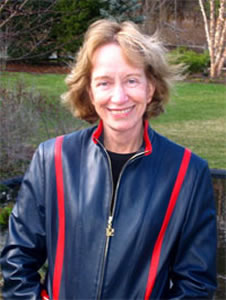
Doris Kearns Goodwin (New York, 4 januari 1943)
De Duitse dichter en schrijver Andreas Altmann werd geboren in Hainichen (Sachsen) op 4 januari 1963. Zie ook mijn blog van 8 juni 2009 en ook mijn blog van 4 januari 2010.
das eisfell
das eisfell glitzert auf den wiesen,
am holz, das von den bäumen blieb.
der vogelschrei fällt hart vom ast,
zerspringt. die klötzer, die vor jahren
noch den stamm vermuten ließen,
sind holzsand, der leicht aufgewölbt
am boden liegt. und jene straße,
die das offne vom verstellten trennt,
hat risse, die im frost noch weiter
springen. vor zeiten haben sie noch was
mit wem verbunden. die augen dazu
blieben stehn. und wenn es worte dafür
gibt, sind sie verbraucht im schweigen.
es gibt schon gruben, die zu füllen sind.
die häuser halten ihren atem an,
wenn sich die tür nur schließt. und durch
die mauern reißt der wind. nach all dem
leben bin ich in die landschaft eingebrochen.
ränder drängen in die tiefe vor. und was
mich abgestoßen hat, blieb ohne grund.
das eisfell gibt den schritten nach,
die viel zu laut sich einen weg erzählen.
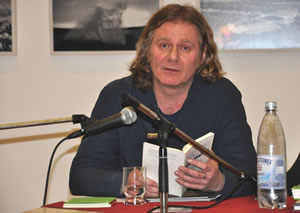
Andreas Altmann (Hainichen, 4 januari 1963)
De Amerikaanse dichter en schrijver Max Forrester Eastman werd geboren op 4 januari 1883 in Canandaigua, N.Y. Zie ook mijn blog van 4 januari 2009 en ook mijn blog van 4 januari 2010.
Out of a Dark Night
Death is more tranquil than the life of love,
More calm, more sure, and more unanguished.
the path among the trees is far more tranquil to the dead
Than to these anxious hearts, uptroubled from their beds,
Who pace in pallid darkness on the leaves,
For no good reason--for no reason
But because their limbs will not lie still upon the sheet.
Their limbs will not lie still. how I pity them.
Sad hearts--their marrow is a-quiver,
And they can not lie them down in tranquil sadness like the dead.
Anniversary
The flowers we planted in the tender spring,
And through the summer watched their blossoming,
Died with our love in autumn's thoughtful weather,
Died and dropped downward altogether.
Today in April in the vivid grass
They flash again their laughter, pink and yellow,
They wake before the frosty sunbeams pass,
Gay bold to leave their chilly pillow.
But love sleeps longer in his wintry bed,
He sleeps as though the lifting light were dead,
And spring poured not her colors on the meadow,
He sleeps in his cold sober shadow.
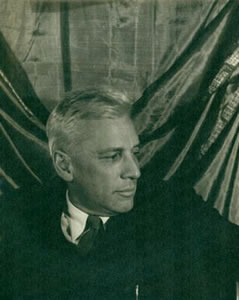
Max Eastman (4 januari 1883 25 maart 1969)
Zie voor nog meer schrijvers van de 4e januari ook mijn vorige blog van vandaag.
|



